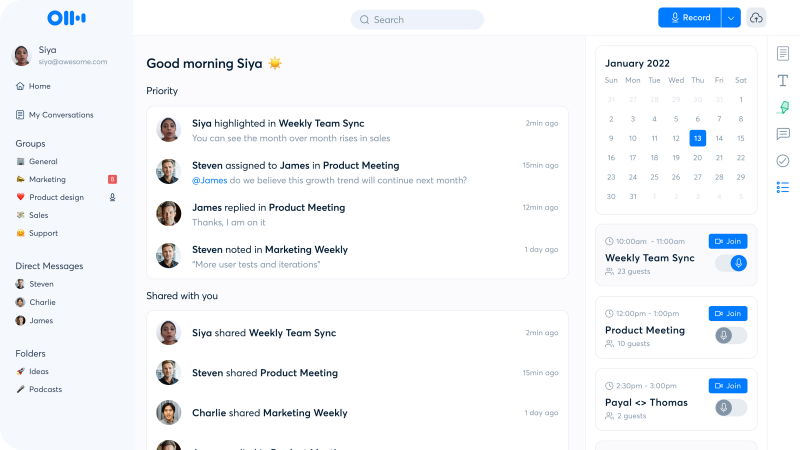Market and brand research tools are your hidden weapons in your journey to understand your target customers — and attract new ones.
You might think you have knowledge of most things concerning your target audience already, but if you don’t have the data to support it, your guess can send you down the incorrect path.
Market research is all about figuring out who your potential customers are, how you can reach them, and what they need from you. Back in the day, tools to answer these questions might have consisted of a pen, clipboard, and phone.
But now, there’s a whole array of smart data analysis and collection systems to choose from. So, where do you begin?
It starts with trying things out! Experimenting with the various options is the only way you’ll know what works best for you and your company. And while some tools aim to serve all your needs, others are more specialized — so it might be best to have a few of the below-listed tools in your arsenal.
The tools we’ve looked at fall into three categories – online listening, broader market intelligence, and direct customer interaction. Pricing goes from free, to the tens of dollars, to enterprise-level commitments in the thousands.
1. Answer the Public
Answer The Public is a free market research tool that helps you figure out what questions people are asking online. Entering your topic on the search page brings up a list of questions, topics, common search terms, and related subjects.
Let’s look at “oat milk” as an example. Amongst the numerous results for this topic, you’ll find:
- “where to use oat milk”
- “which oat milk is best for toddlers”
- “will oat milk curdle”
- “can you recycle oat milk cartons”
These may not necessarily be the topics you’d think people want answers to, but this is the information customers are actually looking for. And if you aren’t answering their questions, rest assured, someone else definitely is.
The insights you find with this tool can inform the development of new products or services, and if content marketing is a channel you invest in, it’s even better.
If you create content that addresses the topics your customers are searching for, you’ll attract more easily them via search engines. Once on your site, you then have a chance to bring them into your marketing funnel in whichever way you prefer.
This is, of course, the foundation of good SEO.
2. Statista
Statista is a market and consumer data portal that covers a huge range of industries around the world.
It’s easy to get started with Statista — just head to their website and try a search. Queries will return hundreds of market research reports, data visualizations, and statistical dashboards created from a variety of sources.
Try “gluten-free goods” for example — it returns a wealth of reports on consumer activity in that product category over recent years. Clicking into the results gives you analytical dashboards, survey sources, and links to similar topics and studies.
It’s a great way to find intel on things like consumer behavior, market trends, demographics, and consumer opinions.
However, if you’d like access to more detailed data, you’ll need to set up a paid account. Still, the free tier is useful as a starting point.
3. Otter.ai

Source: Otter.ai
It’s not what you’d traditionally call a market research tool, but Otter.ai should be a part of any marketer’s arsenal.
It’s an AI-powered transcription software for interviews and meetings. It sits in the background listening to you talk and transcribes your words into plain text — whether you’re talking in-person or remotely.
This means you get a digitized conversation that can be searched, stored in a database, and scored on positive or negative sentiment.
If you’re not talking directly to your customers, you’re missing out. Interviewing them is one of the most valuable ways to learn about your product — with questions like: How do your users feel? What features do they want added? What would convince them to tell their friends about you?
Sometimes, these answers don’t come out in surveys or social media engagement. So, add interviewing to your market research toolkit and you’ll get that human insight that broader demographic research can’t always hit.
4. Spyfu
Spyfu is a search engine analytics platform that allows users to see how their competitors are attracting traffic.
When you visit the homepage, you’ll be asked to enter your competitor’s website address. Spyfu then provides general information about their traffic metrics, where they’re getting traffic from, and what people are searching to find them.
It’s also really useful for finding competitors you didn’t know you had, based on the overlaps in traffic.
There are also paid options with extra features, but the free service still provides some valuable intel. There’s keyword research, backlink checkers, and other useful SEO tools to inform your online marketing strategy.
Despite the name, it’s not designed to encourage you to plagiarize in any way — it’s more about competitor research. And if you want to serve your target audience best, you need to know how well they’re already being served.
Knowing this allows you to find gaps in the market and spot opportunities to expand or improve your offering. It’s definitely worth a shot.
5. Insight7
Insight7 provides a platform for you and your team to organize and analyze market research findings. It uses tags and top-of-the-line highlighting technology to pick sentences and even reports from the web and import them automatically into your dashboard.
This makes it a vital tool for your research team.
You can goto Insight7 to use the tool for yourself or watch a demo here.






